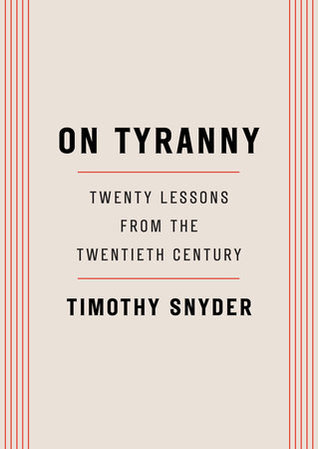 On Tyranny: Twenty Lessons from the Twentieth Century by Timothy Snyder
On Tyranny: Twenty Lessons from the Twentieth Century by Timothy Snyder Published by Tim Duggan Books on March 28, 2017
Source: Gift
Genres: Politics
Pages: 128
Format: Paperback
Add on Goodreads

An historian of fascism offers a guide for surviving and resisting America’s turn towards authoritarianism.
On November 9th, millions of Americans woke up to the impossible: the election of Donald Trump as president. Against all predictions, one of the most-disliked presidential candidates in history had swept the electoral college, elevating a man with open contempt for democratic norms and institutions to the height of power.
Timothy Snyder is one of the most celebrated historians of the Holocaust. In his books Bloodlands and Black Earth, he has carefully dissected the events and values that enabled the rise of Hitler and Stalin and the execution of their catastrophic policies. With Twenty Lessons, Snyder draws from the darkest hours of the twentieth century to provide hope for the twenty-first. As he writes, “Americans are no wiser than the Europeans who saw democracy yield to fascism, Nazism and communism. Our one advantage is that we might learn from their experience.”
Twenty Lessons is a call to arms and a guide to resistance, with invaluable ideas for how we can preserve our freedoms in the uncertain years to come.
My Kindle needed re-charged last night, so even though I really wanted to finish my current read – I’m ready to be done with it, I had to pick up something else. I’d been planning on reading On Tyranny soon, so I grabbed it off my shelf and settled in. It’s a quick read, more of an essay than a full-fledged book, but full of good nuggets.
Snyder opens the book with “History does not repeat, but it does instruct,” and goes on to give us 20 mini-lessons we can learn from history, most notably from the Hitler, but also from Eastern Europe, the Soviet Union, and Putin’s Russia. The warnings and lessons are well-presented, easy to read and understand and they’re important.
Some quotes I want to share:
“Take responsibility for what you communicate with others. (72)” “Since in the age of the internet we are all publishers, each of us bears some private responsibility for the public’s sense of truth. If we are serious about seeking the facts, we can each make a small revolution in the way the internet works. (79)”
“The hero of a David Lodge novel says that you don’t know, when you make love for the last time, that you are making love for the last time. Voting is like that. Some of the Germans who voted for the Nazi Party in 1932 no doubt understood that this might be the last meaningfully free election for some time, but most did not. Some of the Czechs and Slovaks who voted for the Czechoslovak Communist Party in 1946 probably realized that they were voting for the end of democracy, but most assumed they would have another chance. No doubt the Russians who voted in 1990 did not think that this would be the last free and fair election in their country’s history, which (thus far) it has been. Any election can be the last, or at least the last in the lifetime of the person casting the vote. (28-29)”
“So chose an institution you care about – a court, a newspaper, a law, a labor union – and take its side. (22)”
At heart, On Tyranny is asking us to pay attention, to believe in truth, to stand up if necessary. We need to vote and march and read and give money to the causes that are dear to us.
One lesson was more or less devoted to Churchill – Stand Out. “Churchill instead resisted, inspired and won. (55)” We recently watched Darkest Hour and it tied in so well with that. It’s funny how things tie together sometime. Amber is reading Hamlet in her English class and On Tyranny‘s epilogue begins and ends with quotes from that play. I actually told Amber she should read the book. I think she’d get a lot out of it, but I also know that neither she nor I are Trump supporters.
On Tyranny is clearly anti-Trump. Blatantly. It doesn’t encourage us to look at our politicians and the yardsticks, like the words they chose, the types of activities they encourage, the people they surround themselves with, and come to our own conclusions. It tells us, without ever actually naming Trump, that “the president is a nationalist, which is not at all the same thing as a patriot. A nationalist encourages us to be our worst, and then tells us we are the best. A nationalist, ‘although endlessly brooding on power, victory, defeat, revenge,’ wrote Orwell, ‘tends to be uninterested in what happens in the real world.’ (113-114)” I think my problem is that if you’re anti-Trump, this books will affirm your fears. If you’re pro-Trump, you’ll see the author as blowing things way out of proportion. Either way, I’m not sure that you’ll (we’ll) take the lessons in the broader context, when we should.

This sounds like a fascinating, timely read, but as someone who is also anti-Trump, I have to agree with your critique of this book taking such a blatant anti-Trump stance. I think it can be a lot more effective to let people draw their own conclusions from the facts you present.
Exactly. Sometimes you have to trust your audience and not spoon feed them.